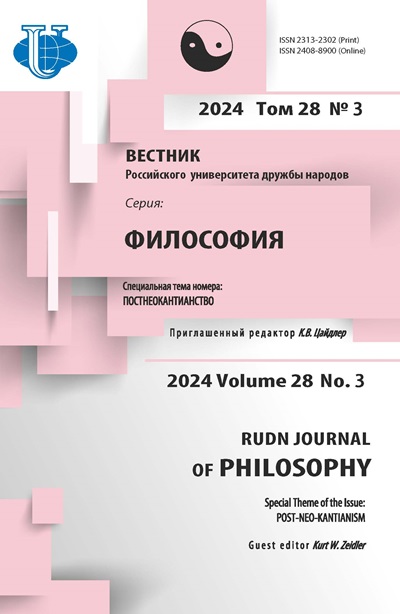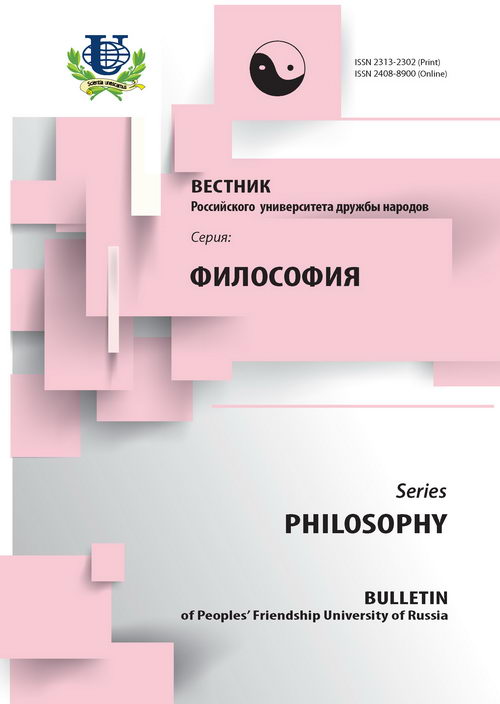No 4 (2011)
- Year: 2011
- Articles: 14
- URL: https://journals.rudn.ru/philosophy/issue/view/728
Articles
Editorial note <http://www.multitran.ru/c/m.exe?t=3289471_1_2>
RUDN Journal of Philosophy. 2011;(4):5-5
 5-5
5-5


The problem of the first concepts in the philosophy of G.W. Leibniz: from attributes of god to transcendental ideas
Abstract
The article gives a reconctruction of the evolution of Lebniz' view of the problem of the first concepts which could be a basis of the universal science (scientia generalis). In his analisis of his earlier trieatise on combinatorics and the earlier sketches for his encyclopedistic projects the author shows Leibniz to be influenced by R. Lull, J. Bisterfeld and J.H. Alsted and stresses the Aristotelian roots of his interpretation on the connectieon between the necessary ana contingent truths.
RUDN Journal of Philosophy. 2011;(4):6-20
 6-20
6-20


The textological problems in studies on the philosophy of F.W.J. Schelling
Abstract
In the article the author focuses on the situation with sources for the work of the German philosopher F.W.J. Schelling. The article argues for the necessity of giving up several methodological stereotypes typical for the traditional approaches to the history of the German idealism and tries to outline the main trends of the developing an interdisciplinary research strategy for studies on Schellings philosophical work. The author shows on this example the indissoluble connection between textology and hermeneutics in the history of philosophy.
RUDN Journal of Philosophy. 2011;(4):21-29
 21-29
21-29


An admissibility of force: the problem of a moral policy in russian thoughts
Abstract
In the article is analyzed the dispute proceeding already more than century in Russian philosophy, which concerns correctness of using the violence. The polemic developed by I. Il'in concerning L. Tolstoy's doctrine about nonresistance to harm force, has found the ready response as from side N. Berdyaev, and other thinkers of the beginning of the last century. It was not finished even to our days, provoked still N. Makiavelli and I. Cant's creativity. The author, being based on scrupulous perusal of primary sources, aspires to place accents, being based on the concept of a humanistic policy.
RUDN Journal of Philosophy. 2011;(4):30-40
 30-40
30-40


The discussion about relation between faith and reason in the russian theological colleges in the XIX century
Abstract
The article deals with the problem of relation between faith and reason in works of philosophy professors at various russian theological colleges in XIX century. The author analyses the evolution of the problem in the history of christian philisophy and try to define the specific features of the solution proposed by the russian theologians of the XIX century.
RUDN Journal of Philosophy. 2011;(4):41-50
 41-50
41-50


 51-70
51-70


Lao_zi or Confucious? Hu Shih's position in the discussion about the first chinese philosopher
Abstract
The article is devoted to the analysis of the position of Chinese philosopher Hu Shih in the philosophical discussion in China about the historical priority of Lao-zi or Confucious. Hu Shih's argumentation of historicity of Lao-zi and of his priority is reproduced. Analyzing Hu Shih's polemics with Ling Qichao and Feng Youlan reveals the ideological background of this scientific debate.
RUDN Journal of Philosophy. 2011;(4):71-79
 71-79
71-79


Concepts and issues of classical arab-muslim philosophy
Abstract
The paper analyzes the controversial topic - the concept of classical Arab Muslim philosophy. Along with clarifying ideas of classical philosophy the author considers problems of classical Arab Muslim philosophy, which determined the foundation of Muslim East philosophical traditions.
RUDN Journal of Philosophy. 2011;(4):80-87
 80-87
80-87


Influence on the formation of late-Kalam al-Kushayri views
Abstract
This article is devoted to one of the most famous sufy theoretics of the Xth century al-Qushchayi (986-1072) whose treatise Principles of Sufism is considered to be one of the most readable works on theory of Islam mysticism among sufies all over the world. This article deals with the ideological basis of al-Qushchayi's work. Basing on the arabic sources and modern studies, the author comes to the conclusion that this famous sufy follows the ideas of Asharite theology. In the article are examined the main Asharite ideas and their influence on al-Qushchayi's works, that include ideas of atomism, free will and predestination, divine attributes, etc. In addition, the article examines the historical and social conditions of the certain Caliphate period and their influence on the Arab thinker.
RUDN Journal of Philosophy. 2011;(4):88-96
 88-96
88-96


Byzantinism concept and concern in the creation of K. Leontiev
RUDN Journal of Philosophy. 2011;(4):97-102
 97-102
97-102


Buddhism and faith in Vietnam
RUDN Journal of Philosophy. 2011;(4):103-111
 103-111
103-111


Posymodernisy Biblical hermeneutics
Abstract
The article describes postmodernist approaches in Biblical hermeneutics. The basic principle of feminist theology is the affirmation of the full humanity of women. Afrocentrism is an attempt to re-read Scripture from an Africa-centered perspective. Socio-rhetorical approach uses the insights of sociolinguistics, semiotics and ethnography.
RUDN Journal of Philosophy. 2011;(4):112-121
 112-121
112-121


The Hartshornian Way: A Way to Solve Dualism
Abstract
The Western way of thinking has been dominated by the Aristotelian law of the excluded middle. Even though Hegel tried to initiate a revolution in the Western thought through his dialectical logic, the Aristotelian logic or the either/or logic still haunts the European philosophy. However, the Hegelian logic is not clear enough in epistemological terms to solve the problem of dualism. It is Charles Hartshorne who could be said to have successfully solved this problem in the West. In the article the author demonstrates what he calls the Hartshornian Way and argues for this way as the only one through which truths of the opposites can be successfully recognized and combined together.
RUDN Journal of Philosophy. 2011;(4):122-130
 122-130
122-130


On Our Authors
RUDN Journal of Philosophy. 2011;(4):131-132
 131-132
131-132
















